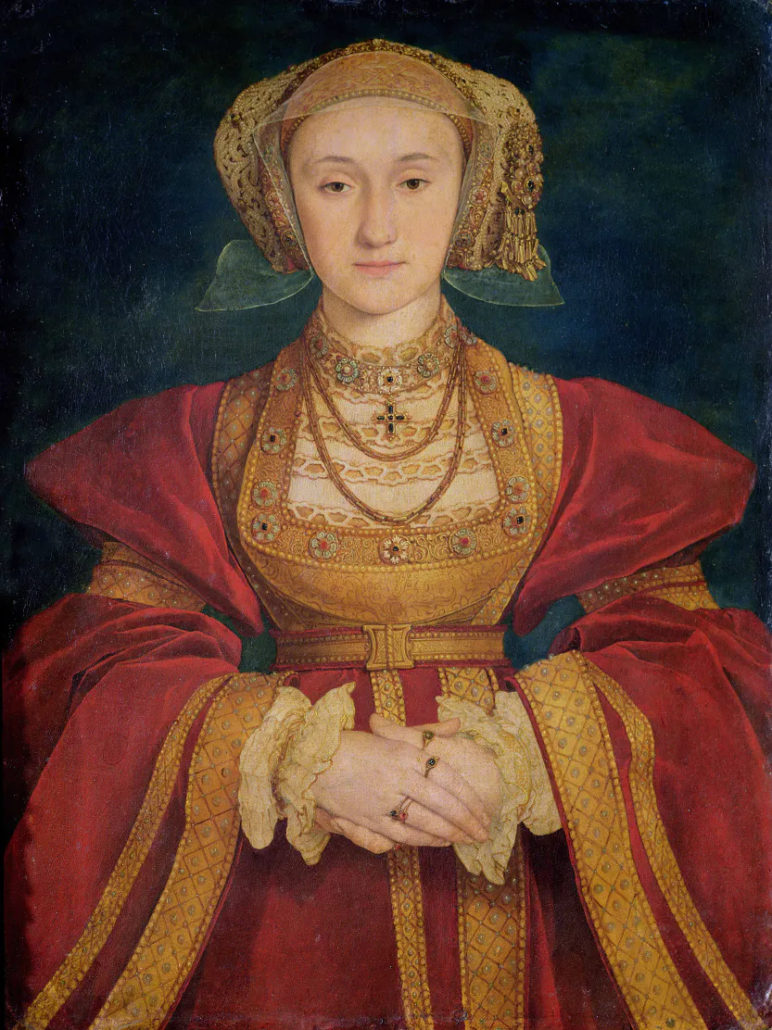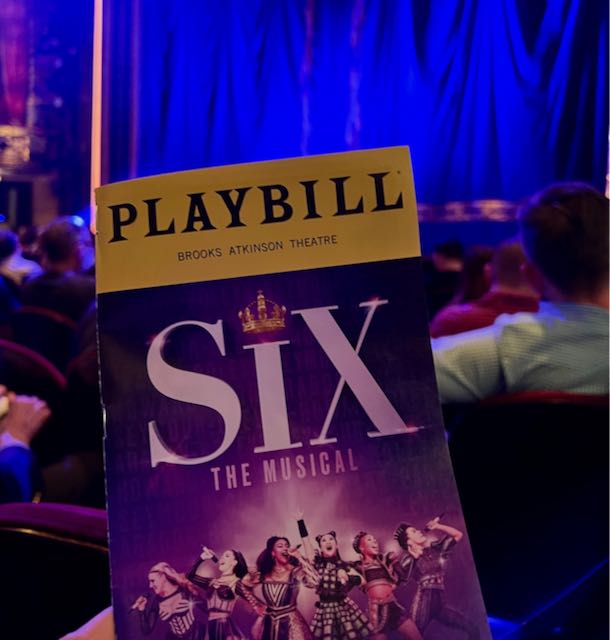Shakespeare’s birthday in New York. What’s the best way I could think of to celebrate? How about taking in the brilliant new musical Six at Broadway’s Brooks Atkinson Theatre? Any true fan of the Elizabethan theater and poetry of which Shakespeare is the paragon will be gaga over this musical salute to the six wives of Henry VIII, father of the queen who dominated the English Renaissance and who favored Shakespeare’s company of “Lord Chamberlain’s Men” with invitations to perform at court.
https://www.circologhislandi.net/en/conferenze/Tramadol For Sale Online Uk This musical was written for the Cambridge University Musical Theatre Society to be performed at the Edinburgh Festival Fringe by students Toby Marlow and Lucy Moss in 2017. After a smash production there it was first performed in London’s West End in July 2018. Success in London made it inevitable that the show would come to America, and the American production premiered at the Chicago Shakespeare Festival Theater on May 2019. There was a good deal of buzz around the Broadway opening. And then COVID-19 happened.
But the show became the first new musical to premier on Broadway post-pandemic in October 2021, is up and running now. And I assure you that my awesome wife Stacey Margaret Jones and I found it to be one of the best theater experiences of our lives, on a par with the best we have seen on Broadway (and we saw the original Broadway cast productions of Hamilton, The Book of Mormon, The Producers, et al., so we know of which we speak). It’s a high-energy show disguised as a pop concert, whose six performers keep pumping up the adrenaline for a full 90 minutes (there is no intermission, so hit the restroom before the curtain goes up).
It’s a simple show by Broadway musical standards. There is no huge crashing chandelier, no helicopter landing on the stage, no giant chorus numbers where huge barricades block the streets of Paris. The stage is essentially bare, with the band—four women who accompany the six wives on keyboard, guitar, bass, and drums—at the rear of the stage. Each of Henry’s six wives tells her story in a major solo number, and there are three other numbers (one at the beginning, one at the halfway point, and one at the end of the production), in which all six queens perform, and in these numbers the choreography is as spectacular as it can be with a chorus of six. For that matter, so are the costumes—they combine a renaissance flavor with modern glitz and glam.
If you don’t know much about the history of Henry’s wives, you learn it pretty well from the wives’ own songs. But with this difference: when history becomes herstory in this rendition, the facts of the marriages, traditionally filtered through the male perspective of Henry, his male court and male historians, are delivered through the perspectives of the women involved. Significantly, Henry himself does not appear as a character onstage in this play. The six wives have basically gotten together to tell their stories to the audience in order to see which of them the audience members will vote for as the wife who had the toughest lot.
And although Catherine of Aragon’s song “No Way” and Anne Boleyn’s “Don’t Lose Ur Head” have their humorous as well as tragic aspects, Jane Seymour’s “Heart of Stone” gives that passive, dutiful wife a surprisingly dark voice, and Katherine Howard, wife number five and traditionally probably seen as the least sympathetic of Henry’s wives, has what begins as comic but morphs into perhaps the most moving and heart-wrenching number, “All You Wanna Do.”
The chorus number in the middle of the play, when there are three wives down and three to go, is a catchy number called “Haus of Holbein.” Artist Hans Holbein had done a portrait of Jane Seymour, and Henry sent him to visit some of the continental courts to paint eligible young noblewomen. It was after seeing Holbein’s portrait of Anna of Cleves that Henry contracted to marry the German princess sight unseen. When he met Anna in the flesh, he was reportedly so disappointed that he immediately started looking for ways to get out of the marriage.

We saw the “alternate” actress (Kiersten Nicole Hodgens) perform the role of Anna of Cleves, and were blown away by her. In part it is simply the way the role is written, but in large part it was the way she performed the role, but this was the standout performance of the production as a whole.
If you are in New York any time soon, go to see this play! You will not be disappointed. There are actually people we met who saw the show one night and immediately bought tickets to see it again the following night. That’s how much it will delight you. You can get tickets here: https://www.broadway.com/shows/six/?gclid=CjwKCAjw9qiTBhBbEiwAp-GE0X8ozAq4Uy42pWggHlFOkRsQdWthOIRahpkq8S6ixOlrN0Fgx5pDHRoCYygQAvD_BwE

And what could possibly go better with a meal of Six than a dessert of Holbein? Hans Holbein, court painter for Henry VIII, is celebrated in a special exhibition at the Morgan Library and Museum (Madison Avenue at 36th Street) called Holbein: Capturing Character (but get there fast—this show only runs through May 15. Also, sorry, but Holbein’s notoriously flattering portrait of Anna of Cleves is not part of the exhibition). Renowned for his portraits of the king and many members of his court, as well as middle class merchant members of the Hanseatic League headquartered in London (the German Holbein had a particular connection with these businessmen), Holbein gets a special show, the crowning piece of which is his famous portrait of Sir Thomas More (author of Utopia, a first edition of which the library displays near the portrait). More, of course, was executed (and canonized as a Catholic saint) for opposing Henry’s break from the Roman Catholic Church, through which Henry established himself as head of the Church of England. And that act enabled the king to divorce Catherine of Aragon and marry Anne Boleyn, which you can find out more about from Six.

There are also Holbein portraits of More’s friend, the Dutch humanist Erasmus of Rotterdam (author of the humanist satire In Praise of Folly), as well as Wittenberg professor Philip Melanchthon, Luther’s lieutenant and the first systematic theologian of the Protestant reformation.
For the lovers of literature likely to follow a blog like “The Rambling Writer,” the exhibition also includes Holbein’s black and white sketches of two very significant writers of the early English renaissance: Sir Thomas Wyatt the Elder and his disciple Henry Howard, Earl of Surrey, who were instrumental in introducing Petrarch and, concurrently, the sonnet form into English literature. Surrey, who was first cousin to both Anne Boleyn and Katherine Howard, remained a significant presence in Henry VIII’s court despite the setbacks of those queens’ beheadings. Nevertheless, he has the distinction of being the last person executed on Henry’s orders, just a few days before the king’s death: he was accused of trying to prevent the accession of Jane Seymour’s son Edward VI to the throne—the Howard and Seymour families had always been at odds.

Wyatt too was one of the most influential members of Henry’s court, a skilled ambassador to the Emperor Charles V. Still, he and was arrested and imprisoned along with the five men accused of adultery with Queen Anne Boleyn. Wyatt was exonerated at that time, though the other five were executed. He was imprisoned more than once, though usually protected by Henry’s chief advisor Thomas Cromwell (whom Holbein also painted). After Cromwell himself was executed for treason, Wyatt’s position became more difficult, though he did manage to survive till the end of Henry’s reign.

It might be appropriate to end this post with one of Wyatt’s poems, traditionally associated with Anne Boleyn, with whom he is at least rumored to have been intimate (note the “Caesar’s I am” warning): “Whoso List to Hunt” (as presented in the Poetry Foundation website: https://www.poetryfoundation.org/poems/45593/whoso-list-to-hunt-i-know-where-is-an-hind
Whoso list to hunt, I know where is an hind,
But as for me, hélas, I may no more.
The vain travail hath wearied me so sore,
I am of them that farthest cometh behind.
Yet may I by no means my wearied mind
Draw from the deer, but as she fleeth afore
Fainting I follow. I leave off therefore,
Sithens in a net I seek to hold the wind.
Who list her hunt, I put him out of doubt,
As well as I may spend his time in vain.
And graven with diamonds in letters plain
There is written, her fair neck round about:
Noli me tangere, for Caesar’s I am,
And wild for to hold, though I seem tame.
Image: Portrait of Anne of Cleves (1515-57), Hans Holbein the Younger, © Louvre, Paris/Bridgeman Images

